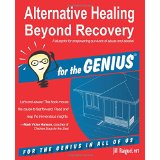-
How to Survive the Holidays
- Posted on November 1, 2022
- by Catherine Boyer
- in New York Neurofeedback
- Comments Off on How to Survive the Holidays
 Once again, i’s time for a holiday post. Whenever I post this message, it’s usually one of the most viewed posts of the year. Why? I’ll get to that in a minute.
Once again, i’s time for a holiday post. Whenever I post this message, it’s usually one of the most viewed posts of the year. Why? I’ll get to that in a minute.It may not seem directly related to NeurOptimal® Dynamical Neurofeedback® – other than that training your brain makes most things in life easier. Benefits from having trained typically mean more ability to choose how to respond, rather than react in the same old way. (No one can get to us like our families can!) That makes a difference, perhaps especially at holiday time.
Back when I was first training as a psychotherapist, long before I had even heard of neurofeedback, I was the assistant to the leader of a workshop called How to Survive the Holidays. The leader was Jill Raiguel, MFCC, author of Alternative Healing beyond Recovery, a book that is chock full of the lifeskills many of us didn’t get to learn from our families. These skills can be particularly helpful during the holidays.
The holiday workshop was the best attended of all the many workshops we did, which told me how big a problem holidays can be for people.
 Since then, I’ve watched for opportunities to be helpful around the holiday season, including these annual posts.
Since then, I’ve watched for opportunities to be helpful around the holiday season, including these annual posts.The suggestions below have been tried, tested and added to for more than 30 years. I hope they help you have a good experience – or a least a better experience – of the holidays.
The healthier your family is, the less difficult holidays are and the more enjoyable they are. The more dysfunctional your family, the more important it is to have a survival plan. Include as much of the following as fits for you. If you have additional ideas, please post them in the comments section.
How to survive the holidays
- If you’re visiting or your family is visiting you, make sure you get time away from the house. Go for a walk, run an errand, see a movie. This is easier when you’re the visitor, but sometimes just five minutes alone in the backyard or a walk around the block can help.
- Have a support person lined up. That could be your good friend from where you live now, ready to remind you over the phone that you have a life outside your family. Get professional support if you need it.
- If you are the visitor and there are people you like who live in the same town or city as your family, make plans to see them on your own during the visit.
- Conduct an experiment: Study your family members as if you were meeting them for the first time. This will give you some helpful distance and perspective. And it can be surprising.
- If possible, agree to rule out touchy subjects.
- Remember: You are not your family; you are your own completely separate person.
One last thing: Good self care may include saying no to family celebrations. Some family situations are just too charged or may have too much potential for re-abuse to make going appropriate. If that is true for you, instead create something celebratory with friends or set yourself up for something you would enjoy on your own. Or volunteer at a place that has meaning for you.
Please ask questions or make comments here. You’re also welcome to email me, including if you’re curious about how NeurOptimal® might be helpful with these kinds of situations and with life in general.
Catherine Boyer, MA, LCSW-R
New York Neurofeedback
If you enjoyed this article please consider sharing it!





